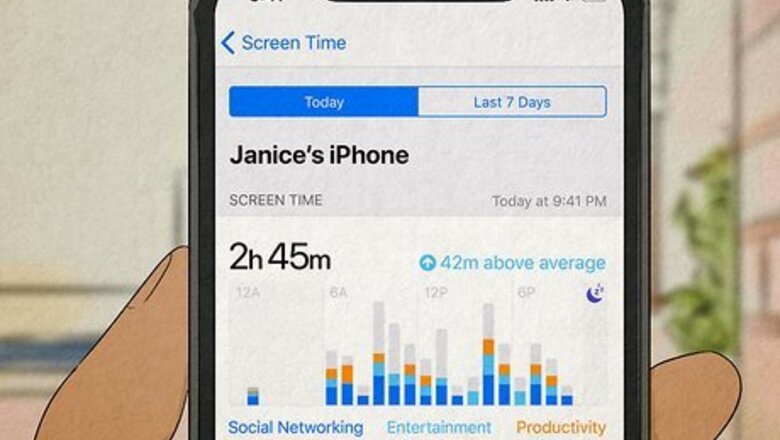
views
Track where you’re spending your most time.
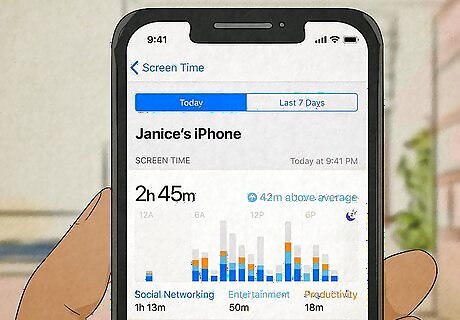
Find out where to start reducing your social media and internet use. Use an app like RescueTime on your computer to learn what sites and social media you’re using the most. If you have an iPhone, use the built-in “Screen Time” feature to see what social media and other internet-based apps you spend the most time on. If you use Screen Time, be sure to remember your password. There are other 3rd-party apps for Android phones to track usage. Google phones have a built-in feature called Wellbeing. Once you know where most of your time is going on your devices, you can try different ways to stop visiting those sites and apps. Licensed therapist Lauren Urban, LCSW, advises, "Pay attention to when/why you engage with social media. Is it mindless or are you paying attention to what you’re doing? Is it meant to numb or distract? Is it meant to help you decompress? Details such as these will help you figure out what purpose the behavior is serving and come up with replacements for scrolling social media for when you’re bored, need to relax, want to discharge some emotional energy, etc."
Use an app to reduce your phone use.
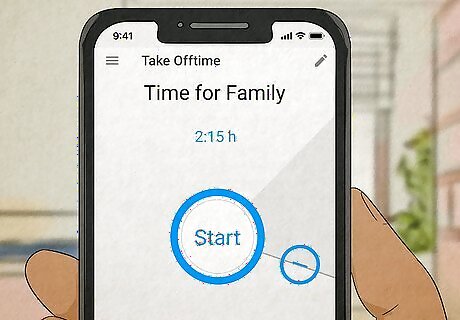
Ironically, there are apps to help you get off your smartphone. Choose an app that lets you block specific apps like Facebook and Instagram and limit yourself to the internet features you need, such as your work email. Or, opt for an app that lets you completely lock your phone for a set amount of time or at certain hours. For example, Offtime (for iOS and Android) lets you block distracting social media and other apps and choose from filtered modes like “work,” “family,” and “me time” to allow yourself access to certain things you need. Moment (for iOS) is another option. It lets you track your device usage and set limits for yourself. It notifies you whenever you pass the limits you set. Or, there’s Flipd (for iOS and Android), which lets you lock your phone for a certain amount of time. Once you lock your phone, bypassing the app is impossible. You have to wait until the time is up!
Disable social media notifications on devices.
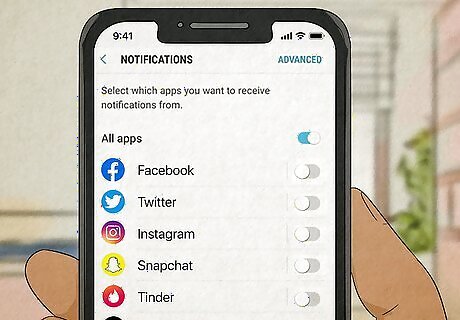
Notifications trigger an almost involuntary response to log on. Go into the app settings on your device for each social media app and turn off all the notifications. That way, there’s no constant buzzing, dinging, and beeping calling you to check your social media networks. If you don’t need to be urgently notified of incoming work emails, go ahead and turn off your email notifications as well!
Install browser extensions to block sites.
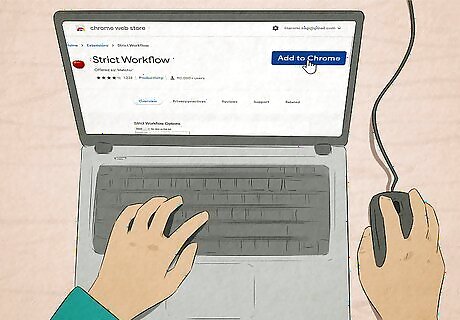
Browser extensions let you block certain sites on your PC. Start by blocking social media sites like Facebook, Instagram, and Twitter. Add any other sites that you find distracting to your block list as well. That way, you can only use your computer for work or other necessary things. For example, StrictWorkflow (free for Chrome) allows you to opt into a phase of focused work time, during which it blocks you from visiting whatever sites you choose. Or, there’s StayFocusd, which lets you block sites permanently or for a set amount of time each day.
Limit how often you check your devices.
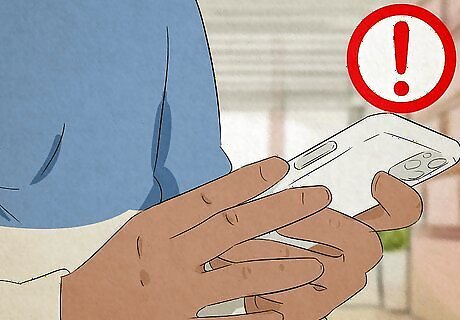
Gradually wean yourself off social media and the internet. If you find yourself checking social media or browsing the internet every 15 minutes, start by limiting your checks to every 30 minutes. When that gets easier to do, increase the amount of time between uses to 45 minutes or 1 hour. If it’s really hard to avoid grabbing your phone or another device frequently, put the distracting device in another room to make it easier. Or, put your device in a bag or in a closet in between checks to keep it out of arm's reach and remove the temptation. Licensed therapist Lauren Urban, LCSW, says, "Research has linked social media consumption with depression and anxiety, as well as loss of productivity and difficulty completing tasks."
Schedule your internet time.
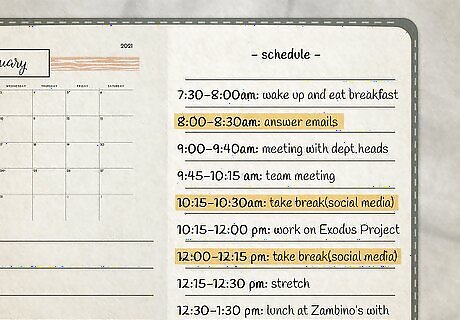
Create a clear division between internet time and time for other things. Pick a time in the morning to check emails, news sites, and other things you like to look at on the internet. Give yourself a cutoff to close the internet and focus on other activities and responsibilities. For example, you might decide that 9 a.m. to 10 a.m. is your time to check and reply to emails and catch up on the latest news. After that, it’s time to focus on work, family, or other important things. Stop using technology 30-60 minutes before bed. Using technology right before bed can negatively affect sleep quality. Try doing something analog before bed to disconnect, like reading a book or journaling.
Turn your phone off during activities.
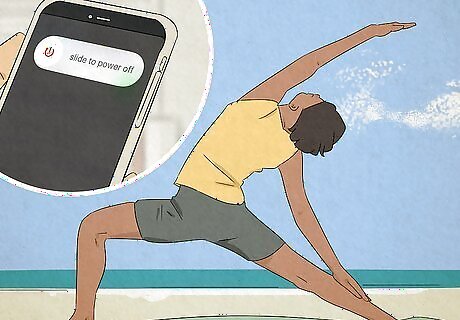
Take away the option to check social media compulsively. Turn your phone off when driving, in a meeting, eating a meal, hanging out with friends, or at the gym. Practice giving all your attention to whatever you’re doing at the moment instead of distracting yourself by scrolling through your social media feeds or using other apps. Better yet, don’t bring your phone anywhere unless you really need it! That way, you’re completely removing the temptation to get online.
Delete social media apps from devices.
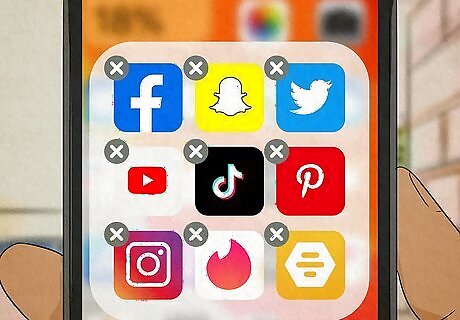
It’s drastic, but if the apps aren’t there, you can’t use them! Uninstall apps like Facebook, Instagram, and Twitter from your phone or tablet. That way, you can only check them from your computer, so you’re less likely to do it as frequently. If you find there are just 1 or 2 apps that are sucking up all your time, you can start by deleting just those and seeing if it helps limit your social media use. For instance, if you mainly spend hours scrolling through Instagram, get rid of that. You could also try moving apps over to a screen other than the home screen on your devices so your thumb doesn’t go straight to them when you pick up your phone or tablet.
Take digital breaks periodically.
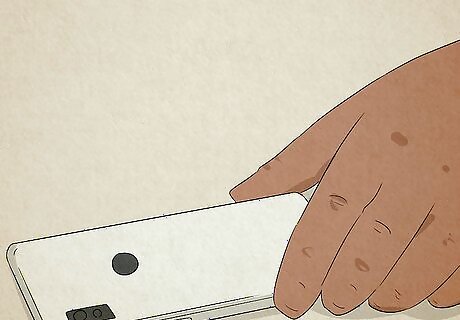
Cut out social media and internet use for a set period each week. Pick a time when you don’t need to check your work email or use your devices for other essential activities. Commit to not checking social media or using the internet during this period and repeat it every week. Use the time to focus on other activities, like spending time with family, catching up with friends, or completing a personal project. For example, you might choose to go offline starting at 5 p.m. on Fridays and not allow yourself to check social media or use the internet again for 24-48 hours. It’s okay to set some exceptions, such as allowing yourself to use a map app for directions or video calling your family. Life and Career coach Annie Lin says, "If you feel depleted and lethargic after using social media, or you feel envious and anxious that you’re not where you should be in life, you probably need a break. "
Do a screen-free hobby for at least 1 hour a week.
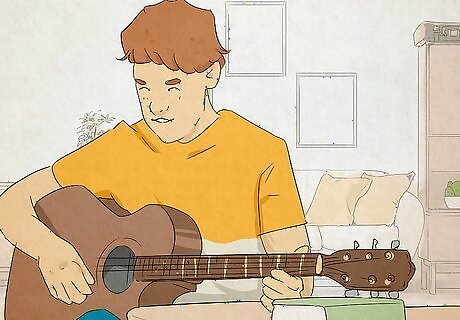
A hobby gives you something to spend time on that’s not the internet. Take a yoga class, start learning to play an instrument, start gardening, sign up for the gym, or do anything else that interests you. At the beginning, commit to spend just 1 hour a week on the hobby, then gradually ramp up the hours or take up more hobbies. Make sure you turn off your phone or hide your devices while you do your chosen hobby so you don’t get interrupted or distracted by social media and the internet.
Spend more time with friends offline.

Make it a point to schedule in-person social activities. Go to dinner with friends once a week, get together with a group of people for a weekend hike, or reach out to people you haven’t seen in a while and schedule a catch-up date. If you feel like you don’t have anyone to spend time with, reach out to acquaintances and ask them to join you for lunch or a coffee — you can always make new friends! You can also join a club or attend meetups to spend more time on offline social activities. For example, look for a local hiking group or a weekly board game club.




















Comments
0 comment